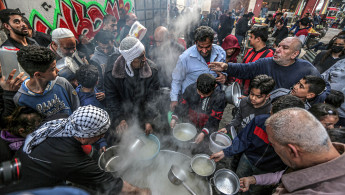Russia’s invasion of Ukraine could cause food shortage in Palestinian Territories: US to UNSC
The war in Ukraine could result in dire food shortages in the occupied Palestinian Territories, US Deputy Ambassador Richard M. Mills told the UN Security Council (UNSC) on Monday.
Russia’s invasion has led to fears of global food shortages, with Ukraine being one of the world's biggest exporters of wheat.
The US has now agreed that Palestinians could be impacted by the projected food shortages.
"Due to President Putin’s unprovoked aggression against Ukraine, food insecurity could worsen even further in the coming weeks, both in Gaza and the West Bank as prices of food, fuel and other commodities rise," he said.
Mills' comments were echoed by the UN’s Special Coordinator for the Middle East Peace Process Tor Wennesland, who told the UNSC that the "rising prices and market disruptions ... threaten food security levels of vulnerable [Palestinian] families".
There has been a 42 percent rise in the refugee agency's quarterly circulation costs for the besieged Gaza Strip, where the UN is responsible for almost 60 percent of food provision, according to Wennesland.
Mills’ comments came after multiple rights groups and NGOs warned of potential food shortages and a spike in the price of staples - such as bread - in the West Bank and Gaza.
Earlier this month, Oxfam warned that wheat stocks in the West Bank and Gaza could run out "within three weeks".
"Palestinian households are hit hard by rising global food prices, and many are struggling to meet their basic needs," said Shane Stevenson, the Oxfam Country Director in the Occupied Palestinian Territory and Israel said in an 11 April press release.
"The reliance on imports and the constraints forced upon them by Israel’s continuing military occupation, settler violence and land grabs are compounding the food crisis."
Both Ukraine and Russia are among the world’s top producers and exporters of wheat.
Moscow's invasion has disrupted food supplies across the world and seen a spike in inflation.
Several countries in the region - including Tunisia, Egypt and Lebanon - are scrambling to find alternative sources of grain to feed their populations.





 Follow the Middle East's top stories in English at The New Arab on Google News
Follow the Middle East's top stories in English at The New Arab on Google News
![The UAE is widely suspected of arming the RSF militia [Getty]](/sites/default/files/styles/image_330x185/public/2024-11/GettyImages-472529908.jpg?h=69f2b9d0&itok=Yauw3YTG)
![Netanyahu furiously denounced the ICC [Getty]](/sites/default/files/styles/image_330x185/public/2024-11/GettyImages-2169352575.jpg?h=199d8c1f&itok=-vRiruf5)
![Both Hamas and the Palestinian Authority welcomed the ICC arrest warrants [Getty]](/sites/default/files/styles/image_330x185/public/2024-11/GettyImages-2178351173.jpg?h=199d8c1f&itok=TV858iVg)